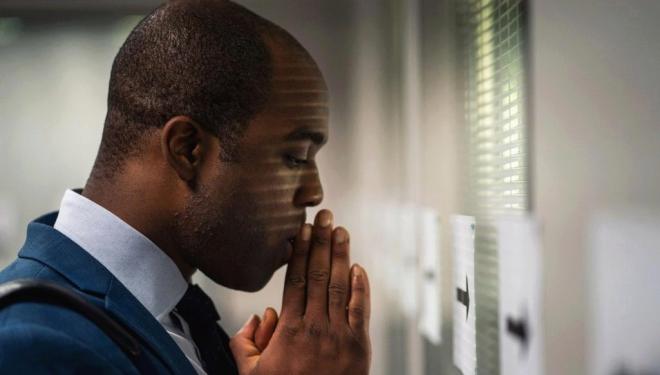
And, initially, his adapting A Christmas Carol feels like another strange swerve. It’s almost worth asking: why bother?
But within a few minutes of the first episode, we’re glad he did. Knight and director Neil Murphy (Save Me) returns Dickens’s most famous story to the thick, black soot of industrial London, a time the author consistently condemned. This Christmas Carol possesses all the polluted colours of Peaky Blinders, maybe even darker, and wallows in the horrors of the 1840s.

Guy Pearce brings one of the most pessimistically philosophical depictions of Scrooge put to screen
Scrooge
isn’t just a grumpy cartoon who hates Christmas and everyone outside: he’s also conducted many evil acts to suit his capitalistic greed. But
there’s a humanity to him, beautifully brought to life by a gruff Guy Pearce,
who finds the buried warmth in one of literature’s coldest characters. It’s
one of the most intellectual and pessimistically philosophical depictions of
Scrooge to grace screens big and small.
And unlike many of the countless adaptations, Knight relates to the dark inside Ebenezer’s soul, and many of the latter’s logical arguments ring depressingly true: ‘if it were possible for so many mortals to look at the calendar and transform from wolf to lamb, then why not every day?’. He sees through the artifice that populates the Christmas period and cuts it apart, using it to justify his cruelty to others.
But this isn’t just Scrooge’s story, we also follow the ghost of Jacob Marley (Stephen Graham) in depth. The series opens on Marley’s grave, as a vengeful boy urinates on his tombstone. Marley lays awake in his coffin six foot under, and endures the urine dripping on his face.

Stephen Graham brings his usual soft but tortured performance to Jacob Marley
With some desperate humour, Marley shouts ‘the inscription clearly says Rest in Peace!’. After striking
a deal, he endures a Good Omens-like descent into Purgatory, envisioned as
a hellish foundry. Graham brings his vividly soft but tortured personality to
Marley in another astounding performance (he starred in The Virtues, Line of Duty, and The Irishman — all in 2019) that nearly steals the lead’s
smoggy limelight.
It’s not until the final act of episode one when Scrooge and Marley have their catalytic, dead-as-a-doornail encounter — in a grim, gruesome, and horrifying scene that competes with the existential scares of the original tale. Although Knight stretches out the narrative with different character-focuses, literary dialogues and morbid soliloquising, the extension feels necessary. In order to know and even like Scrooge, we need to spend a lot of time with him, and Knight is in no rush.
This critic isn’t sure where exactly this Christmas Carol will go, despite the story being universally known, but it looks to be a bleakly enticing journey ahead. Knight doesn’t only pursue the supernatural terrors, but also the fears that encapsulate Britain’s cruel industrial history and the chains of guilt wrapped around it.
A Christmas Carol airs on Sunday 22 December at 9pm on BBC One, continuing Monday 23, and concluding on Tuesday 24.
| What | A Christmas Carol, BBC One review |
| When |
22 Dec 19 – 24 Dec 19, 9:00 PM – 10:00 PM |
| Price | £n/a |
| Website | Click here for more information |





